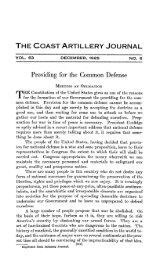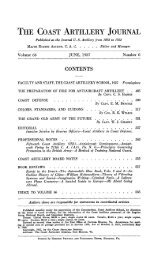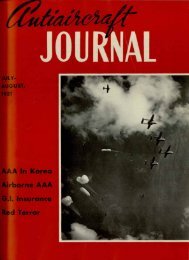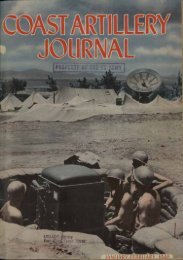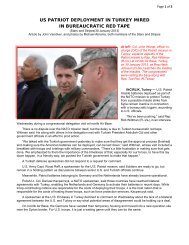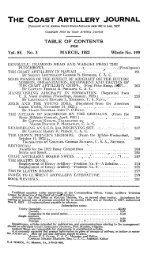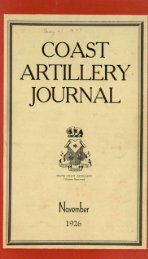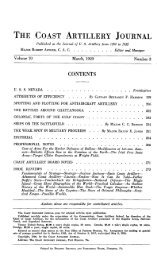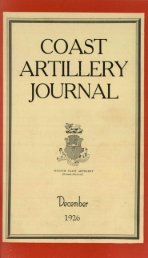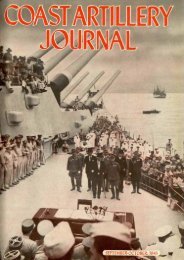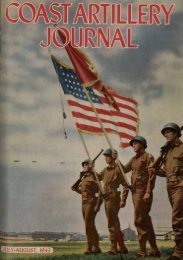Activation of new aaa units - Air Defense Artillery
Activation of new aaa units - Air Defense Artillery
Activation of new aaa units - Air Defense Artillery
Create successful ePaper yourself
Turn your PDF publications into a flip-book with our unique Google optimized e-Paper software.
19-+8 GE;..JERAL DEVERS URGES COLLEGE LANGUAGE TRAINING 35<br />
hospitals, rooms ror billets, etc. Q.l\1. Co,Ws, Medical<br />
Corps, and mess <strong>of</strong>ficers were plagued by their hourly unpleasant<br />
contacts with French help, be they charwomen,<br />
LlUndrv 'workers, waiters, etc. Militarv Railwav <strong>of</strong>ficers <strong>of</strong><br />
the T~ansportation Corps had to solve countless thorny<br />
problems with their French counterparts; Port Officers had<br />
daily squabbles 'with the French stevedores in charge <strong>of</strong><br />
thousands <strong>of</strong> .i\loroccan longshoremen. And what was<br />
true <strong>of</strong> our <strong>of</strong>ficerswas true also <strong>of</strong> our noncoms, who, once<br />
the policies had been set at higher levels, had to carry out<br />
their execution "ith French or Arab subordinates. Thus,<br />
because most <strong>of</strong> our army technicians did not know French,<br />
they had to depend, for ~very little thing, on the services <strong>of</strong><br />
a liaison <strong>of</strong>ficer,or a civilian interpreter.<br />
"\Vhen we landed in Italy <strong>new</strong> problems arose, since<br />
\yc were forced to bring along a very large Italian-speaking<br />
personnel to handle what was called 'Civilian Affairs.'<br />
Those AMGOT <strong>of</strong>ficers had to take care <strong>of</strong> thousands <strong>of</strong><br />
problems connec~ed with the daily needs <strong>of</strong> the civilian<br />
population and a pitifully small number <strong>of</strong> them was prep~1redto<br />
do so. In Italy also, a <strong>new</strong> headache was added<br />
by the fact that se\'eral French divisions were part <strong>of</strong> the<br />
U.S. 5th Army. A number <strong>of</strong> our older French-speaking<br />
liaison <strong>of</strong>ficers",ho had seen service in \\'orId \Var I, \yere<br />
sent to the headquarters <strong>of</strong> the generals commanding each<br />
division, while some <strong>of</strong> us \rere attached to the general<br />
commanding the French Supply Base 901. All <strong>of</strong> us had to<br />
be jacks-<strong>of</strong>-all-trades, handling problems connected \vith<br />
everybranch <strong>of</strong> the service; the \vorst came \vhen a French<br />
mou'ntain division disembarked \vith thousands <strong>of</strong> mules<br />
\\,hich had to be taken care <strong>of</strong>.<br />
"Then, 'when we started preparing for the im'asion <strong>of</strong><br />
Southern France, more French divisions' arrived. Naples<br />
\\'as like a tower <strong>of</strong> Babel with U.5., British, French, Polish<br />
and Moroccan soldiers filling the streets. One should<br />
not forget that <strong>Air</strong> Force ground <strong>of</strong>ficerswent through the<br />
samethroes as Army <strong>of</strong>ficerswhen it came to language problems.Add<br />
to this the fact that Red Cross personnel had to be<br />
found \'\'ho spoke Italian as \.vell as French. And U.S.<br />
nurses who spoke French were at a premium since some<br />
wards in our hospitals were used exdusiyely for \munded<br />
men from the French diYisions.<br />
"'Ye landed in France. The French didsions had been<br />
\\'ithdrawn from the 5th Armv and, with <strong>new</strong> ones added,<br />
formed the French 1st Arm)'. This time, an important<br />
French liaison section under Brigadier' General Schwinn<br />
and Colonel Chamberlain (\\'ho had tauoht French at<br />
\rest Point before the ,,'ar) was attached'"to the Headquarters<br />
<strong>of</strong> General de Lattre de T assigny to handle all <strong>of</strong><br />
the liaison \vork with the U.5. 7th Armv, since both<br />
formed the 6th Army Group under comma~d <strong>of</strong> General<br />
Jacob L. Devers whose liaison <strong>of</strong>ficer \yas no other than<br />
~.S. Senator Henry Cabot Lodge, Jr. From this central<br />
haison section, French-speaking US. Army <strong>of</strong>ficeG were<br />
detached to the Headquarters <strong>of</strong> e.flchFrench diyision. On<br />
the supply echelon, the organization had been completely<br />
re\-amped; the French Base 901 had been integrated into<br />
COXAD Base: French and U.S. <strong>of</strong>ficers and enlisted men<br />
\\'orkedside by side in every serdce~ but, for lack <strong>of</strong> enough<br />
French-speaking u.s. personneL most <strong>of</strong> the liaison \york<br />
was carried on by English-speaking French personnel.<br />
"\Ve had a great deal <strong>of</strong> security work to do in the Proyost<br />
]\larshal Section, and a thorough knowledge <strong>of</strong> French<br />
was more important than ever before: we had seven l\lilitary<br />
Police companies scattered behind the front line <strong>of</strong><br />
the 6th Army Group, and everywhere the security as well<br />
as the GI.C. and GI.D. work was done in close liaison<br />
with city police, and especially with the Gendarmerie<br />
Nationale whose help proved invaluable in our daily quest<br />
for German parachutists and saboteurs. Since the l\1.P.<br />
actiyities include establishing and guarding Prisoner <strong>of</strong><br />
\Var cages, a large number <strong>of</strong> men speaking German \"as<br />
required; many more were needed on the teams which<br />
questioned the P.W.s. Also, German was priceless for<br />
the men in the GI.G groups who, very <strong>of</strong>ten, had to enter<br />
German cities ahead <strong>of</strong> the infantry. But German never<br />
was so complicated a problem as French since manv <strong>of</strong> our<br />
men from all sections in the U.S. spoke it Huently: having<br />
learned it at home.<br />
"-;\lanyother problems presented themselves: serious ones<br />
like the coaching <strong>of</strong> men who were parachuted behind the<br />
lines, and the training <strong>of</strong> men for G-2, Gr.e. and O.S.S.<br />
work; trivial but important ones nevertheless like those <strong>of</strong> the<br />
Red Cross Personnel who had to establish G.I. clubs, snack<br />
bars, movie houses, etc., in hundreds <strong>of</strong> towns and cities<br />
where our men were bivouacked 011 sent to rest. These Red<br />
Cross organizers had to speak Frenah to be able to get along.<br />
This should be enough to give you an idea <strong>of</strong> the complexity<br />
<strong>of</strong> the task for which foreign language speaking personnel<br />
was in great demand oyerseasduring World War II.<br />
"One should also remember that each one <strong>of</strong> our men<br />
~peaking the language <strong>of</strong> the country he is invading is a<br />
potential ambassador <strong>of</strong> good ,yill. Since, usually, he is a<br />
college educated man, he is able, in his conversations with<br />
the inhabitants, to explain to them many points about our<br />
military, political and social problems. It is he \.... ho builds<br />
the opinion that these people have <strong>of</strong> us. After VB-Day,<br />
\yhen I was brought back from Germany to become Dean<br />
<strong>of</strong> Studies in charge <strong>of</strong> 450 US army students at the Universitv<br />
<strong>of</strong> Nancv, I realized more than eyer the \wnderful<br />
unde~standing ~reated by a group <strong>of</strong> fine young men speaking<br />
a foreign language. Not only did they make a great<br />
impression on the man in the street because <strong>of</strong> their fine<br />
appearance, their nice manners and good behavior, but the<br />
uniyersitv teachers were amazed at their knowledue and<br />
_ 0<br />
their \yillingness to learn more.<br />
"'Ye must keep in mind that if we must fight a <strong>new</strong> war,<br />
the students 1.'\;hoare in our classrooms at present will be<br />
the <strong>of</strong>ficers <strong>of</strong> tomorrO\L College graduates formed the<br />
majority <strong>of</strong> the <strong>of</strong>ficersin \\'orld \Var I, and it was truer still<br />
in \\'orld \Var II. \\'ith the increasing need for technicians<br />
in the army, the demand for men with college degrees will<br />
be still ooreater<br />
if there is a \\'orId \Yar III.<br />
"In the last war. , the army_ learned to make 0good<br />
use <strong>of</strong> its<br />
men according to their qualifications, and it is probable<br />
that carefully selected liaison personnel \wuId be sent and<br />
kept in the countries <strong>of</strong> our Allies, the language <strong>of</strong> which<br />
they \'.'ould be familiar \.\ith.<br />
"But in my opinion, liaison <strong>of</strong>ficers and interpreters are<br />
not the proper solution to the problem <strong>of</strong> foreign languages



